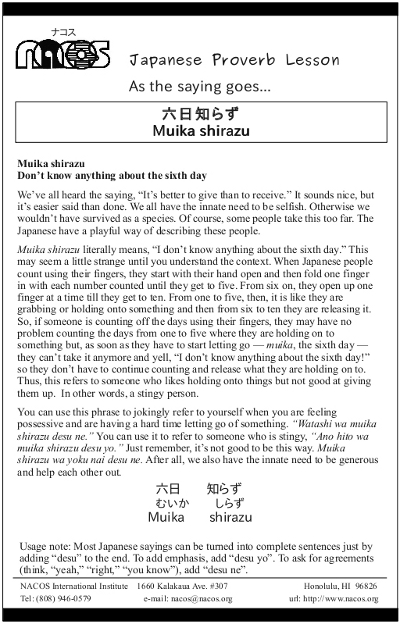Muika shirazu
Don’t know anything about the sixth day
We’ve all heard the saying, “It’s better to give than to receive.” It sounds nice, but it’s easier said than done. We all have the innate need to be selfish. Otherwise we wouldn’t have survived as a species. Of course, some people take this too far. The Japanese have a playful way of describing these people.
Muika shirazu literally means, “I don’t know anything about the sixth day.” This may seem a little strange until you understand the context. When Japanese people count using their fingers, they start with their hand open and then fold one finger in with each number counted until they get to five. From six on, they open up one finger at a time till they get to ten. From one to five, then, it is like they are grabbing or holding onto something and then from six to ten they are releasing it. So, if someone is counting off the days using their fingers, they may have no problem counting the days from one to five where they are holding on to something but, as soon as they have to start letting go — muika, the sixth day — they can’t take it anymore and yell, “I don’t know anything about the sixth day!” so they don’t have to continue counting and release what they are holding on to. Thus, this refers to someone who likes holding onto things but not good at giving them up. In other words, a stingy person.
You can use this phrase to jokingly refer to yourself when you are feeling possessive and are having a hard time letting go of something. “Watashi wa muika shirazu desu ne.” You can use it to refer to someone who is stingy, “Ano hito wa muika shirazu desu yo.” Just remember, it’s not good to be this way. Muika shirazu wa yoku nai desu ne. After all, we also have the innate need to be generous and help each other out.
Usage note: Most Japanese sayings can be turned into complete sentences just by adding “desu” to the end. To add emphasis, add “desu yo”. To ask for agreements (think, “yeah,” “right,” “you know”), add “desu ne”.


